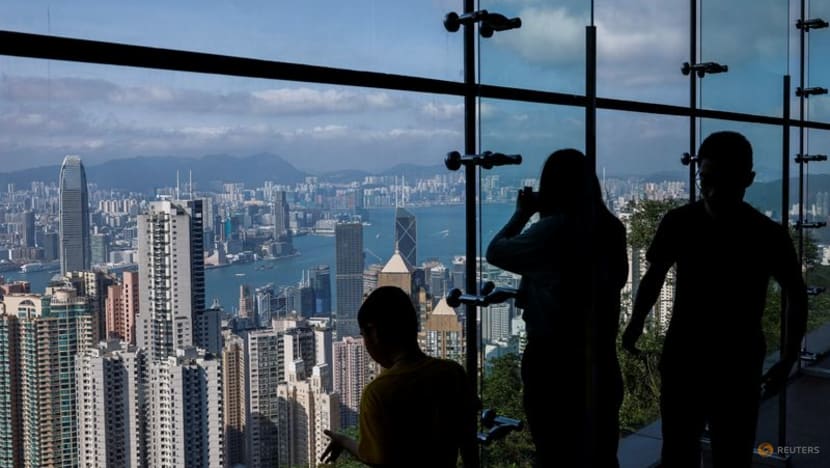How US-China tensions are reshaping Hong Kong’s future as a global hub
Economists warned that as tensions continue to simmer between China and America, the most viable path forward for Hong Kong may be doubling down on its China advantage.

FILE PHOTO: Tourists take photos in front of the financial Central district and Victoria Harbour in Hong Kong, China, May 9, 2023. REUTERS/Tyrone Siu/File Photo

This audio is generated by an AI tool.
HONG KONG: Since China imposed a national security law on Hong Kong in 2020, it has steadily increased its control over the city.
Beijing has also escalated efforts to strengthen economic and social links between the Chinese special administrative region and the mainland.
But with intensifying geopolitical tensions between the United States and China, Hong Kong’s proximity to mainland China – which has long been one of its greatest economic assets – is becoming a double-edged sword.
DROP IN NUMBER OF REGIONAL HEADQUARTERS
One company that has capitalised on this geographical proximity is Micro-Pak, a Hong Kong-based supplier of anti-mold products for the garment and footwear industries.
From its global head office in Hong Kong, the company manages product development and coordination with its manufacturing bases in China. Today, it sells 3.5 billion products a year with an annual turnover of US$100 million.
“China can’t be beat. That’s where you need to be. There's an endless supply of everything in China,” said Micro-Pak’s managing director Martin Berman.
“Here, if we have to see a customer urgently – many of our customers, it's just a couple of hours away. Our distant customers may be five hours away in a high-speed train, so if we have to see them today or the latest tomorrow, it's a pretty simple thing.”
But there has been growing competition from mainland cities, while Hong Kong’s status as a global trade and finance hub has also come under scrutiny amid the US-China rivalry.
Official data showed that the number of regional headquarters of multinational companies based in Hong Kong dropped by 13 per cent between 2019 and 2023.
Employment by these firms fell even more sharply – down 32 per cent to 132,000 staff by the end of 2023.
Professor Heiwai Tang, associate dean of the University of Hong Kong Business School, said he is not so worried about uncertainties or risks, but more about awareness within the city on how it should move on and understanding why it lost business to other places.
“Once companies (have) left, you have to do a lot more to get them back. COVID has led to some foreign companies, especially American firms, to think … this is an opportunity to consider other places in Asia, such as Singapore or Tokyo or some other places in Asia,” he added.
He said Hong Kong needs to “rebrand itself” and “try to project a better image to foreigners”, due to some post-COVID narratives that it is “just another Chinese city”.
“I'm also concerned about how foreigners see Hong Kong, which may not be neutral, which may not be balanced. And this is up to us to tell – a more neutral and more fact-based story about Hong Kong,” he added.
GETTING BUSINESSES BACK
The Hong Kong government has stepped up efforts to win back businesses in recent years, particularly from the Middle East and Southeast Asia.
The city is promoting itself as a gateway to China’s vast consumer market, banking on its longstanding advantages.
These efforts appear to be bearing fruit. In 2024, nearly 10,000 companies with overseas parent firms established a presence in Hong Kong - a 10 per cent increase from the previous year.
A Hong Kong government survey last year found that foreign companies that chose to base their regional offices in the city cited reasons such as a simple tax system, low tax rate and its free port status.
The city believes that despite the geopolitical headwinds, businesses will be able to see the benefits of how global and China advantages can all be found in a single economy in Hong Kong.
This is a point that Micro-Pak’s Berman agrees with, having operated in Hong Kong for almost 30 years.
As an American, he said he believes the Trump administration “is making it difficult to do business no matter where you are”.
Although the city is increasingly being subjected to the same tariffs affecting China, Berman noted: “If you've decided that this is the part of the world you're dealing in, honestly, I don't see any risk factors beyond what you would see in any (other) place.”
But economists warned that as tensions continue to simmer between China and the US, the most viable path forward for Hong Kong may be doubling down on its China advantage – even if it comes at the cost of diluting its status as a global hub.
Gary Ng, senior economist at investment banking firm Natixis, said Hong Kong has been one of the biggest winners from the trend of globalisation over the past two to three decades, especially when geopolitical tensions were less.
“But what we see over the past years is that companies start to think and manage the risk between the Chinese market versus the rest of the world. So I think this change is really a very big challenge for Hong Kong,” Ng noted.
“If the world is still interested in the Chinese market, then Hong Kong can still be a greater China headquarters in that essence. So I think it really depends on which sector it is.
“But in general, definitely the attractiveness may be lower than before and the challenges will be more,” he added.



















